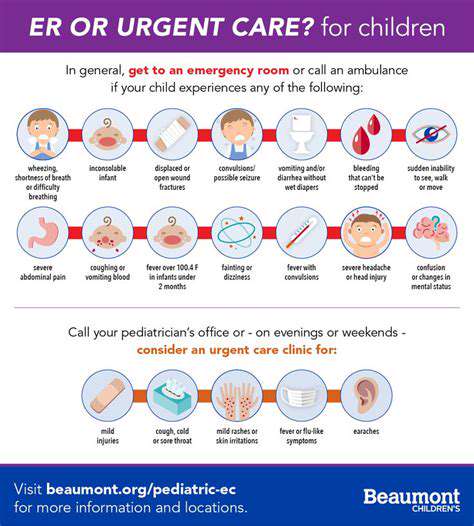Recognizing Symptoms That Require Medical Attention

Recognizing Common Symptoms That Need Immediate Care
Many people are unaware of the importance of seeking medical attention in a timely manner, which can lead to serious consequences for their health. Some common symptoms that require immediate care include severe chest pain, difficulty breathing, severe headache, and severe abdominal pain.
Other symptoms that should prompt a visit to the doctor include a fever over 103°F (39.4°C), seizures or convulsions, and difficulty speaking or swallowing. In some cases, even if the symptoms seem minor, it's always best to err on the side of caution and seek medical attention to avoid any potential complications.
What to Expect When Seeking Timely Medical Attention
In emergency situations, it's essential to remain calm and seek medical attention as quickly as possible. This includes calling the emergency services or rushing to the nearest hospital if it's a life-threatening condition. When arriving at the hospital, be prepared to provide detailed information about your symptoms, medical history, and any pre-existing health conditions.
Your healthcare provider will work with you to assess your condition and provide an appropriate course of treatment. This may involve administering medication, performing tests, or conducting further evaluations to determine the best treatment plan. Remember, timely medical attention can significantly improve the effectiveness of treatment and reduce the risk of complications.
The Dangers of Delaying Medical Care

The Risks of Ignoring Symptoms
Ignoring symptoms can lead to serious health complications. When you delay seeking treatment, minor issues can escalate into major health problems. For example, persistent chest pain might be dismissed as indigestion, but it could signal a heart condition that requires immediate attention.
Listening to your body is vital. Each symptom can provide clues that indicate your health is in jeopardy. By delaying a doctor's visit, you risk prolonging your suffering and potentially jeopardizing your overall well-being.
Chronic conditions like diabetes or hypertension can worsen without proper management. Symptoms such as fatigue or headaches should not be overlooked, as they might point to something more serious. Swift action is crucial in preventing further health decline.
The Importance of Regular Check-Ups
Regular check-ups are essential for maintaining health and preventing disease. These visits allow healthcare providers to monitor any changes in your health over time. Catching issues early can often lead to more effective treatments and a better overall prognosis.
Many diseases, including cancer, do not present symptoms until they are advanced. Regular screenings can help in early detection, increasing the chances of successful treatment. Not only do check-ups provide peace of mind, but they can also save lives.
Establishing a good relationship with your healthcare provider enhances communication regarding your health concerns. It's important to discuss any changes, no matter how minor they may seem, as they can provide critical insights into your overall health status.
Health Consequences of Postponing Care
Postponing medical care can have dire consequences for your health. Conditions like infections can worsen and spread, requiring more aggressive interventions later on. Delaying treatment can lead to permanent damage and even increase mortality rates.
In some situations, timely treatment can be the difference between a full recovery and a long-term disability. For instance, a stroke patient's survival and recovery greatly depend on how quickly they receive treatment. Understanding the urgency of symptoms is vital for favorable outcomes.
Moreover, procrastination in seeking medical attention can lead to unnecessary stress and anxiety as one continues to suffer without relief. This cycle of avoidance can have a significant impact on mental health. Prioritizing timely medical attention fosters both physical and emotional well-being.
Financial Considerations
Understanding the Costs of Delayed Treatment
Many individuals underestimate the financial implications of postponing medical care. Delayed treatment can lead to complications that require more extensive and expensive interventions later. For instance, treating a minor ailment can be far less costly than managing a chronic condition that arises due to negligence.
Insurance coverage often has limitations, and waiting to seek care can influence whether certain treatments are covered. This is particularly relevant for emergencies, where patients may end up with out-of-pocket expenses for services that could have been less financially burdensome if attended to sooner.
Moreover, the opportunity costs associated with missed work and productivity can pile up over time. A small health issue can escalate into a scenario where patients require extended leave from work, further straining their financial resources.
The Importance of Preventative Care
Investing in preventative care can significantly reduce long-term healthcare costs. Regular check-ups and screenings can catch potential health issues early when they are often easier and cheaper to treat. By prioritizing preventative measures, individuals can mitigate the risk of developing serious health conditions that could require costly treatments.
Preventative care doesn't just benefit the individual financially; it also lessens the burden on the healthcare system. When fewer people end up with advanced diseases, resources can be allocated more efficiently, benefiting everyone.
In addition, many insurance plans provide incentives for preventative services, which further enforces the idea that taking proactive steps in health management can save money in both the short and long term.
The Impact of Health on Employment and Income
A person's health can directly impact their ability to work and earn an income. Chronic illnesses or health emergencies can lead to increased absenteeism and decreased productivity, making it harder to maintain job performance. This connection emphasizes the financial ramifications of not seeking timely medical help.
Moreover, employers may feel compelled to make decisions regarding employee retention based on health-related absenteeism. A pattern of missed work due to untreated health issues can affect career advancement and job security.
In some cases, untreated health conditions may even lead to disability, greatly diminishing earning potential. Thus, seeking timely medical attention can play a critical role in maintaining one’s livelihood.
Long-term Financial Burden of Chronic Illnesses
Chronic illnesses often lead to recurring medical expenses and ongoing treatment costs, creating a significant financial burden over time. Failure to address health concerns promptly often results in patients facing long-term management of these conditions, contributing to ongoing healthcare costs.
Moreover, the cost of medications, regular doctor visits, and possibly even hospital stays can create a cumulative financial strain that many are unprepared to handle. Insurance may cover some costs, but patients often face high deductibles and copayments that add up.
By seeking timely medical attention, individuals can potentially avoid the cycle of chronic illness and the financial implications that accompany it. Taking proactive measures can lead to better health outcomes and, consequently, lower costs over a lifetime.
Creating a Sustainable Healthcare Plan
Understanding the financial aspects of healthcare can help individuals create a sustainable plan for managing their health costs. From budgeting for regular check-ups to setting aside funds for potential emergencies, being prepared can alleviate some of the financial stresses associated with healthcare.
It's also essential to assess insurance coverage and understand which services are covered under specific plans. This knowledge can empower patients to seek necessary care without the fear of unexpected expenses. Additionally, many health plans offer resources for financial planning regarding medical care.
Involving financial advisors in healthcare planning can also be beneficial. They can analyze an individual’s overall financial situation and healthcare needs to provide tailored advice that promotes both health and fiscal responsibility.
Utilizing Telehealth Services
Understanding Telehealth Services
Telehealth services have revolutionized the way healthcare is delivered, allowing patients to consult with healthcare providers from the comfort of their homes. This technology has become increasingly significant in ensuring timely access to medical care, particularly for those living in remote areas.
These services encompass a variety of medical activities, ranging from routine check-ups and specialist consultations to mental health support. Patients can communicate via video calls, phone calls, or messaging platforms, making healthcare more accessible and convenient.
Furthermore, telehealth services can be vital during public health emergencies, such as the COVID-19 pandemic, where traditional visits to medical facilities could pose risks of infection. Telehealth allowed healthcare to continue while maintaining safety protocols.
The flexibility of telehealth services accommodates busy schedules and reduces the time and stress associated with in-person visits. Patients can manage their health more effectively, ensuring that they do not overlook necessary medical attention due to convenience barriers.
As telehealth continues to evolve, it is crucial for patients to understand their options and how various platforms work, including insurance coverage, privacy considerations, and the types of services available. Gaining this knowledge empowers patients to make informed decisions about their healthcare.
Benefits of Telehealth for Timely Medical Attention
One of the most significant benefits of telehealth is the speed at which patients can receive medical attention. Conditions that require prompt diagnosis and treatment can be addressed faster, reducing the risk of complications.
Telehealth also eliminates geographical limitations, enabling patients in rural or underserved communities to connect with specialists that might not be available locally. This broad access can significantly improve health outcomes for individuals and communities alike.
Additionally, having the ability to consult with a doctor swiftly can help manage chronic conditions more effectively. Regular check-ins via telehealth can aid in monitoring progress and adjusting treatment plans without the need for frequent in-person visits.
During times of high demand, such as flu season or public health crises, telehealth helps alleviate pressure on healthcare systems. Patients can receive care without crowding emergency rooms or urgent care facilities, which allows for better resource allocation.
Moreover, the emphasis on preventative care through telehealth can lead to early detection of health issues, significantly improving prognosis. Encouraging routine consultations can help identify risks before they develop into more serious problems.
Challenges and Considerations in Telehealth
While telehealth offers numerous advantages, it is not without its challenges. One major concern is the issue of technological barriers. Not all patients have access to reliable internet or smartphones, which could limit their ability to utilize telehealth services.
Additionally, patients may feel apprehensive about using technology for medical consultations, particularly the elderly or those unfamiliar with digital interfaces. This reluctance can hinder the overall adoption of telehealth services.
Privacy and security are also paramount, as telehealth involves sharing sensitive information through digital platforms. Patients must be aware of how their data is managed and the steps taken to protect their privacy.
Finally, not all medical conditions can be effectively treated through telehealth. Situations requiring physical examinations, diagnostic tests, or urgent interventions still necessitate in-person visits, highlighting the importance of a hybrid approach to healthcare.
Overall, recognizing and addressing these challenges is essential for maximizing the potential of telehealth services and ensuring that all patients can benefit from timely medical attention.
Future of Telehealth and Its Implications
The future of telehealth looks promising, with advancements in technology set to enhance the quality and accessibility of healthcare. As virtual consultations become more widespread, there is potential for integrating artificial intelligence and machine learning to improve diagnostics and treatment plans.
Furthermore, telehealth could see increased collaboration among healthcare professionals, allowing for seamless communication and coordination of care for patients with complex health issues. This integrated approach may lead to more comprehensive and personalized treatment options.
As telehealth continues to mature, policies surrounding insurance reimbursement will likely evolve, making it easier for patients to access a broader range of services. This could encourage more providers to adopt telehealth into their practice, further embedding it into mainstream healthcare.
Regulatory frameworks will need to adapt to support these changes while ensuring patient safety and quality of care. Maintaining standards across various telehealth platforms will be crucial in keeping patient trust and satisfaction intact.
Ultimately, telehealth has the potential to transform the landscape of healthcare, making timely medical attention more attainable for all individuals, thereby promoting a healthier population overall.